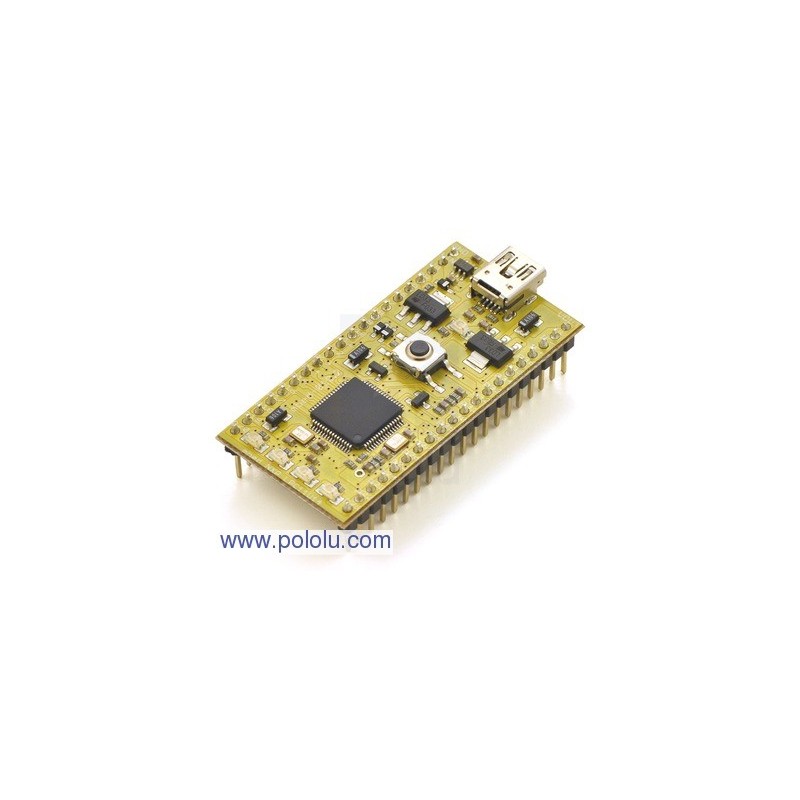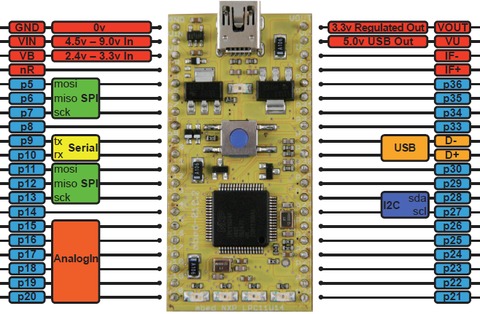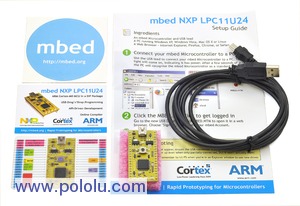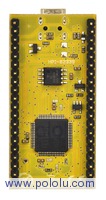

ARM mbed NXP LPC11U24 Development Board
The mbed NXP LPC11U24 is an easy-to-use MCU development board designed for rapid prototyping. At its heart is a low-power 32-bit ARM Cortex-M0 processor running at 48 MHz with 32 KB flash and 8 KB RAM, which makes it more capable than popular, similarly-priced 8-bit prototyping alternatives. A comprehensive firmware library and plenty of sample code help you get your program up and running quickly, and a free online IDE and C++ compiler means that no software installation is required. Downloading programs is as simple as using a USB flash drive (no external programmer is necessary).
The mbed NXP LPC11U24 development board from ARM enables quick and easy creation of low-cost prototypes. Based on the low-power NXP LPC11U24 Cortex-M0 processor, which runs at 48 MHz and offers 32 KB flash and 8 KB SRAM, the 32-bit mbed can outperform popular 8-bit prototyping platforms in the same price range, like the Arduino and Basic Stamp. The mbed NXP LPC11U24 offers a variety of peripherals that includes a USB device interface, analog inputs serial (UART), SPI, and I2C. The mbed has a 40-pin DIP form factor with 0.1"-pitch male header pins already soldered in, so it can be used with standard solderless breadboards and perfboards. (Note that while standard DIP ICs have a row spacing of 0.6", the mbed rows have a spacing of 0.9".)
 |
For applications requiring even more performance or additional peripheral interfaces, consider the mbed NXP LPC1768 as an alternative development board. Our comparison table can help you choose the right mbed for your application.
One of the strengths of this platform is the mbed Library, which provides an API-driven approach to coding that eliminates much of the low-level work normally associated with MCU code development. Code can be developed using meaningful peripheral abstractions and API calls that are intuitive and well tested, freeing you up to experiment without worrying about the implementation of the MCU core or its peripherals.
Another key feature of the mbed is its unique C++ compiler and IDE. These free tools are entirely web-based and run online, which means there is no software to download or install. Supported browsers include Internet Explorer, Firefox, Safari, or Chrome running on a Windows, Mac, or Linux PC. You can log in from anywhere and simply pick up where you left off, and this approach makes it very easy to share code with others. And, since you’re working with a web-based tool, you can be confident that it is already configured and will stay up-to-date. The compiler uses the ARM RealView compile engine, so it produces clean, efficient, optimized code that can be used free-of-charge, even in production. Existing ARM application code and middleware can be ported to the LPC11U24 microcontroller, and the mbed tools can be used alongside other professional production-level tools, such as Keil MDK.
|
|
No external programmer is required to program the mbed. When connected to your computer via the included USB cable, it shows up as a mass storage device. Simply save the compiled binary file to the board to program it.
 |
 |
Getting started is as simple as using a USB Flash drive. Simply connect the mbed NXP LPC11U24 board to a Windows, Mac, or Linux computer and it will automatically appear as a USB drive. Follow the link on the board to connect to the mbed website, where you can sign up and begin designing. There are no drivers to install or setup programs to run. Getting started is so easy that you can have a “Hello World!” program running in as little as five minutes.
The mbed development board includes the necessary USB A to mini-B cable, a printed quickstart guide, and two business cards that contain a life-size pinout diagram for the mbed.
The following videos show just how easy it is to get started using the mbed:
Manufacturer BTC Korporacja sp. z o. o. Lwowska 5 05-120 Legionowo Poland sprzedaz@kamami.pl 22 767 36 20
Responsible person BTC Korporacja sp. z o. o. Lwowska 5 05-120 Legionowo Poland sprzedaz@kamami.pl 22 767 36 20
Xplorer ++ Baseboard - development kit
Development kit based on Vybrid® VF61NS151CMK50 processor equipped with two cores: Cortex-A5 with frequency 500 MHz and Cortex-M4 with frequency 167 MHz. The module has a built-in memory DDR3 128 MB and Flash 256 MB. TWR-VF65GS10
Tower system 802.11n Wi-Fi® module, Freescale Semiconductor, RoHS
MYD-LPC1850 Development Board
The development board FRDM-CR20A expansion board (shield) containing the wireless transmitter MCR20A 2.4 GHz, compatible with the existing development platforms Freedom - FRDM-K64F and FRDM-KL46Z. FRDM-CR20
NXP MRB-KW019032EU is a modular set based on a 32-bit microcontroller with ARM Cortex M0 48 MHz core, equipped with an 868 MHz radio module. MRB-KW019032EU
FRDM-K22F-AGM01 is a set of development plates containing a base plate and a board with a set of 9-axis sensors with an accelerometer, a gyroscope and a magnetometer. FRDM-K22F-AGM01
No product available!
IMXRT1050-EVKB is an evaluation set from NXT with i.MX RT1050 ARM Cortex-M7 600 MHz processor, 256 MB SDRAM memory, USB Host and OTG connector, Ethernet interface and SD card slot. IMXRT1050-EVKB
Evaluation kit i.MX RT1050, Cortex-M7, frequency 600 MHz, 256 MB SRAM, 512 MB Flash
QN9080-DK is a development kit with the NXP BLE SOC QN9080 chip. This system has an integrated 32-bit ARM Cortex-M4F core and a Bluetooth communication system (BLE v5.0). In addition to the board with the QN9080 chip, the set includes a USB dongle (also with the QN9080 chip) which suits the master / slave communication between the two QN9080 chips.
A development kit containing the A71CH Plug & Trust module, enabling easy and fast creation of secure IoT applications. NXP OM3710 / A71CHARD
No product available!
MCIMX6ULL-EVK is an evaluation set from NXT with i.MX6ULL ARM Cortex-A7 900 MHz processor, 4 GB SDRAM memory and USB Host and OTG connector, Ethernet interface and SD card slot. MCIMX6ULL-EVK
Evaluation set FRDM-HB2001-EVM consisting of FRDM-KL25Z baseplate and extension board with DC motor controller MC33HB2001. NXP FRDM-HB2001-EVM
No product available!
Demo and programming kit for NFC tags. Designed for emulation using the NTAG I²C plus tag system in embedded systems. NXP NTAG I2C Plus Explorer Kit
9-axis expansion module with motion sensors. The module combines two integrated circuits: FXAS21002C 3-axis gyroscope and FXOS8700CQ 6-axis accelerometer/magnetometer. The board is equipped with connectors compatible with Arduino R3. NXP FRDM-STBC-AGM01
LPCXpresso55S69 evaluation kit with LPC55S69 microcontroller with ARM Cortex-M33 core. The board contains a built-in debugging probe, audio subsystem and accelerometer, with the possibility of adding ready-made additional boards for connecting to the network, sensors, displays and other interfaces. NXP LPC55S69-EVK
No product available!

ARM mbed NXP LPC11U24 Development Board
